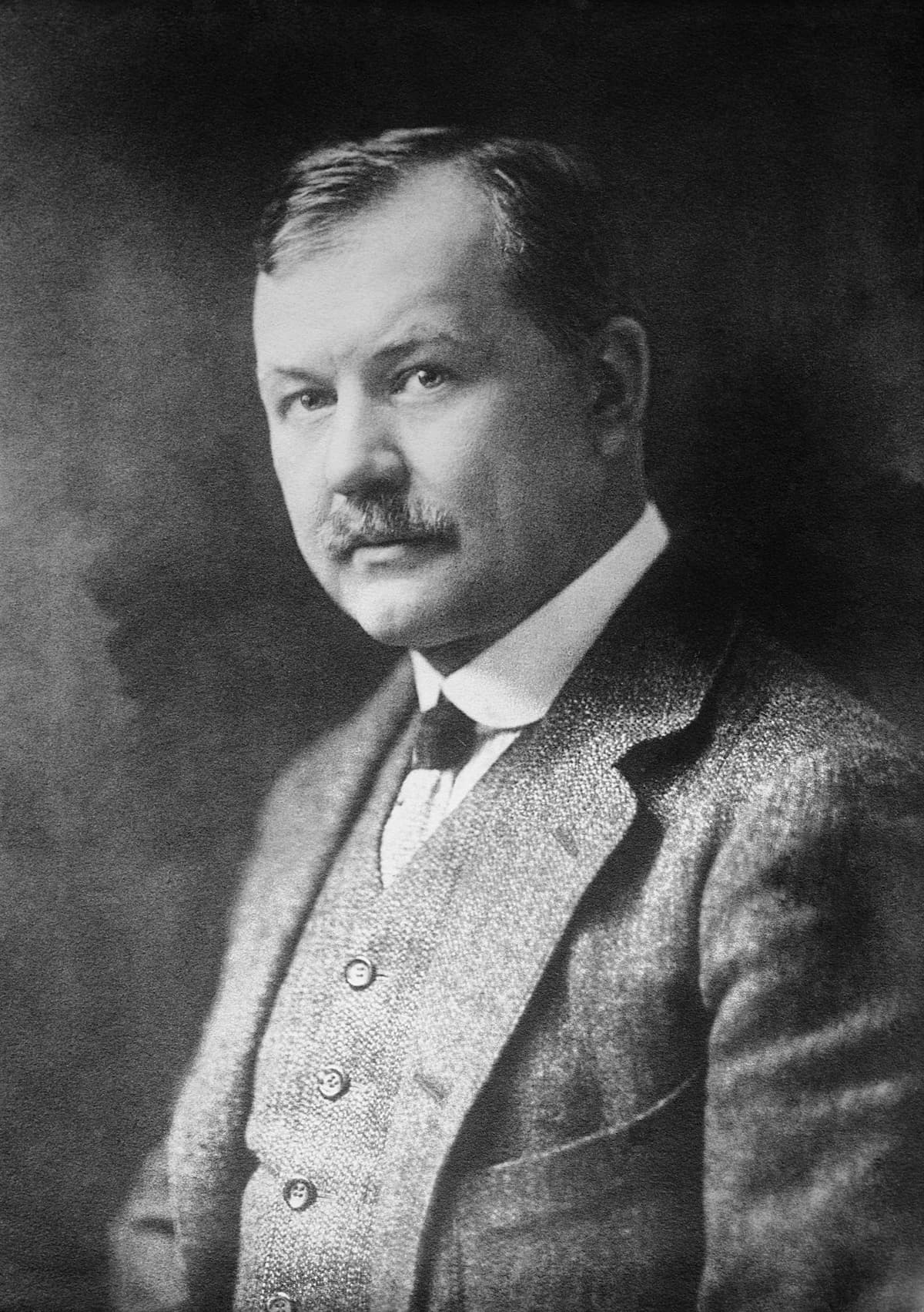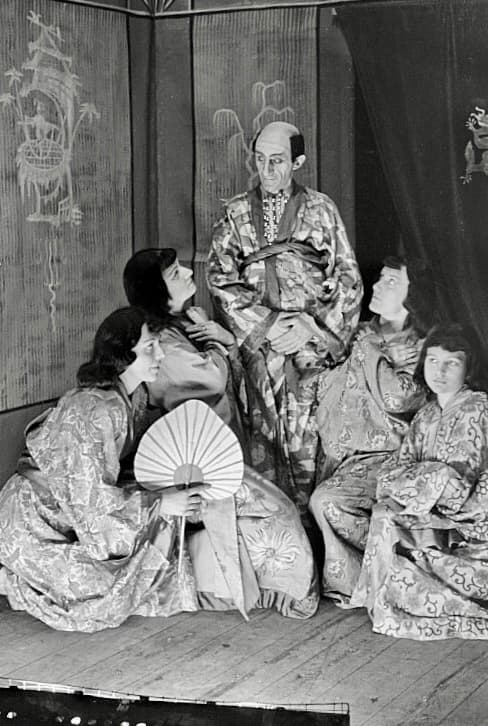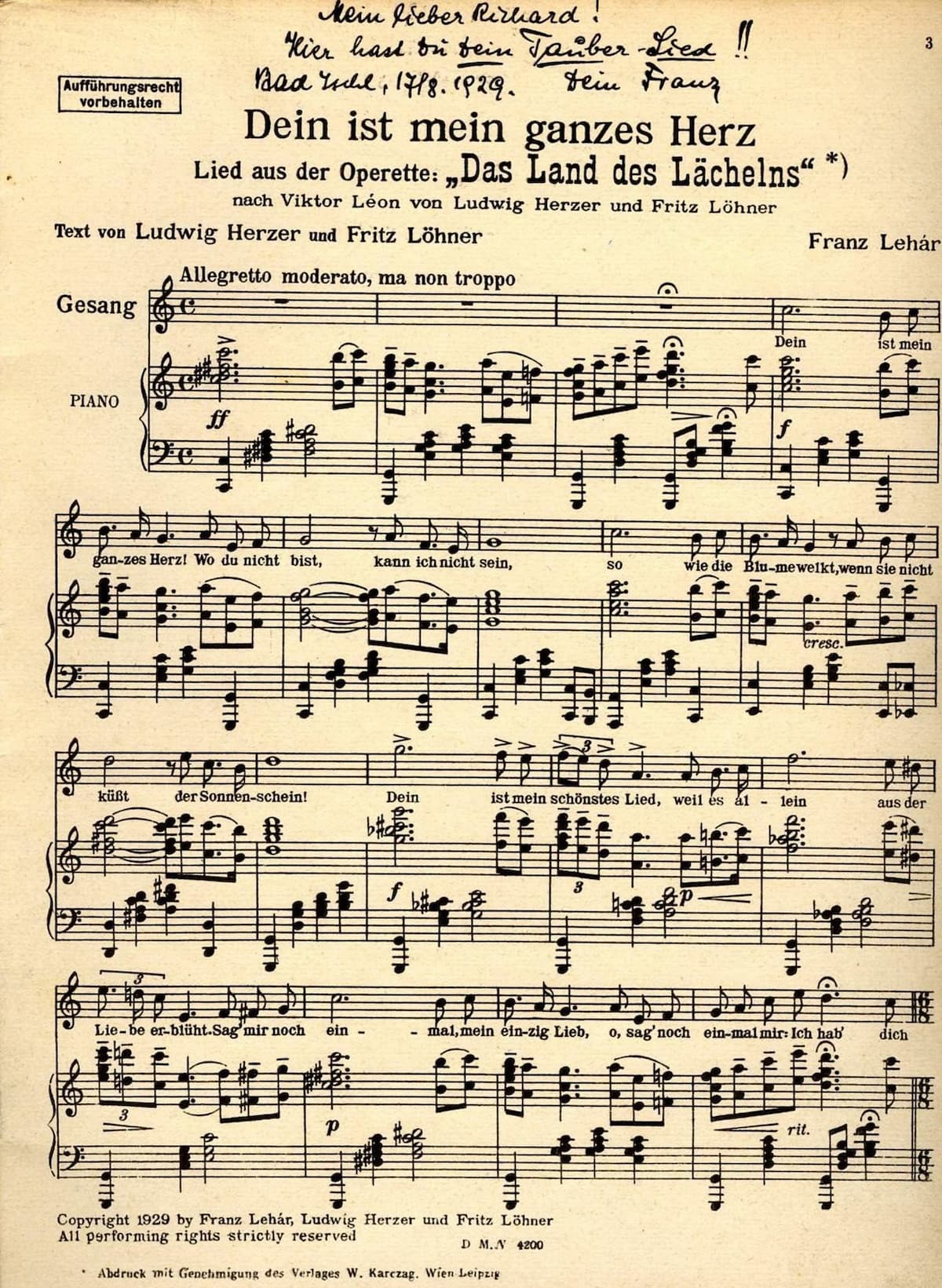The Austro-Hungarian composer Franz Lehár (1870-1948) scored the greatest international success of his later works with a revised version of Die gelbe Jacke (The Yellow Jacket). Premiered at the Metropoltheater in Berlin on 10 October 1928, the romantic operetta Das Land des Lächelns (The Land of Smiles) was quickly turned into a film in 1930, and once again adapted for the silver screen in 1952.
Franz Lehár: The Land of Smiles, “Overture” (Munich Radio Orchestra; Ulf Schirmer, cond.)
In Vienna

Franz Lehár
The action opens in Vienna in 1912, at a ball arranged at the home of Count Lichtenfels (spoken) in honour of his daughter Lisa (soprano.) Lisa is greatly admired by Count Gustl von Pottenstein (tenor buffo), but her attention is drawn to a magnificent Chinese statuette from a Chinese admirer, Prince Sou-Chong (tenor).
The prince keeps his true feelings hidden behind an enigmatic Chinese smile, and the language barrier makes communication difficult. However, the Prince captivates the young ladies with stories of how courting takes place in China when he is suddenly summoned back to China. By that time, however, both the Prince and Lisa had expressed their feelings for each other.
Franz Lehár: The Land of Smiles, “Immer nur lächeln” (Always smiling)
In Beijing

Franz Lehár’s The Land of Smiles
For Act 2, Sou-Chong is installed into office in Beijing and receives the ceremonial yellow jacket. Lisa is living with him, and they share a profound love for each other. Lisa is schooled in the ways of the East by Sou-Chong’s sister Mi (soprano). Mi has also struck up a friendship with Gustl, who has arrived from Vienna in pursuit of Lisa.
When Sou-Chong is reminded by his uncle Tschang (baritone) that he must take four wives according to Chinese custom, he declares that his whole heart belongs to Lisa. Lisa meanwhile, is excited by seeing Gustl as it reminds her of home, but Sou-Chong forbids her to leave. Love gradually turns to hate.
Franz Lehár: The Land of Smiles, “Wer hat die Liebe uns ins Herz gesenkt” (Who has placed love in our hearts) (Irene Eisinger, soprano; Joseph Schmidt, tenor; Berlin State Opera Orchestra; Selmar Meyrowitz, cond.)
Escape

Franz Lehár’s The Land of Smiles, Berlin, 1930
Three weeks later, Sou-Chong has officially married another woman, and Gustl hatches a plan to help Lisa escape. Mi is decidedly happy to be rid of Lisa, but she feels deep regret at the departure of Gustl. Lisa and Gustl attempt to escape through the sacred temple of Buddha, however, the plan fails.
Sou-Chong once again bars her from leaving, but Lisa pleads with him until the Prince finally relents. Realising that Lisa will never be happy under the given circumstances, he places Lisa into Gustl’s care and hides his own sorrow behind an enigmatic smile.
Franz Lehár: The Land of Smiles, “Ich möcht’ wieder einmal die Heimat seh’n” (I long to see my home again)
Orientalism
Almost immediately popular, the operetta’s subject mirrors the passion for all things Asian that greatly influenced various forms of art in the 1920s. What at first glance appears a superficial product of the cult of the oriental, becomes a finely-drawn drama featuring psychologically modern characters, upon closer inspection. The tragic conclusion, instead of the typical happy operetta ending, upturns persistent stereotypes, and the work connects to the economic reality of the impending worldwide depression.
Discussions of orientalism in music in our Post-modern, post-colonial world are often less concerned with music itself than with orientalism as an ideologically suspect phenomenon.
In his musical setting, Lehár was able to combine his popular Viennese waltz style with ambitious vocal writing and a more serious plot. He relied on two fundamental forms of staged exoticism, namely the insertion of the other into familiar circumstances, and an imagined visit to a distant place.
Franz Lehár: The Land of Smiles, “Meine Liebe, deine Liebe” (Love is all the same)
Musical Characterization

Music score of Dein ist mein ganzes Herz
The stylistic markers of the Chinese spheres are predictably pentatonic melodies combined with shrill, high-pitched wind instruments. These comparatively novel sounds are juxtaposed and combined with music familiar to Viennese entertainments. A scholar writes, “the musical exoticism exploits both catchy foreign sound and stereotypical hopes, wishes, and problems associated with the Chinese-European liaison on which the show is based.” In fact, Lehár developed his own operetta style, destroying the barriers and stereotypes between the genre of the opera and the operetta.
The work is rich in oriental colouring with melodies and an orchestration rich in meaning. And let’s not forget that the melodic treasure trove was largely built around the performance of the tenor Richard Tauber. A close friend of Lehár, the composer wrote the customary “Tauberlied,” a signature tune exploiting the exceptional qualities of his voice. “Dein ist mein ganzes Herz,” (My heart belongs to you) might well be the most famous of all “Tauberlieder,” attracting many eminent singers to the role on stage, among them Giuseppe di Stefano, Nicolai Gedda, and Siegfried Jerusalem.
For more of the best in classical music, sign up for our E-Newsletter
